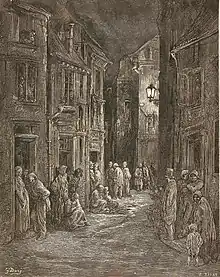
Bluegate Fields (also known as Blue Gate Fields) was one of the worst slum areas that once existed just north of the old, east London docks during the Victorian era. Two streets in the area had actually been named Bluegate Fields at different times: present-day Dellow Street (along the eastern edge of the St. George's-in-the-East churchyard) and Cable Street (along the northern edge of the churchyard).
The area is visited by the eponymous character in The Picture of Dorian Gray by Oscar Wilde,[1] and inspired a scene in The Mystery of Edwin Drood by Charles Dickens.[2] It is referenced in the title of a song (and live album recorded at Wilton's Music Hall in Graces Alley off Cable Street) by Marc Almond.[3]
References
- ↑ Wilde, Oscar (1890). "10". The Picture of Dorian Gray. Project Gutenburg. Retrieved 4 November 2016.
Then, suddenly, some night he would creep out of the house, go down to dreadful places near Blue Gate Fields, and stay there, day after day, until he was driven away.
- ↑ Ackroyd, Peter (1991). Dickens. HarperCollins. p. 1046. ISBN 0060166029.
- ↑ "History". marcalmond.co.uk. Retrieved 7 February 2020.
External links
- Description from victorianlondon.org.
- Map containing the 1746 location of Bluegate Field (just north of the church yard of St. George's-in-the-east).
- Brief but informative description of Blue Gate Fields.
51°30′37″N 0°03′22″W / 51.51028°N 0.05611°W